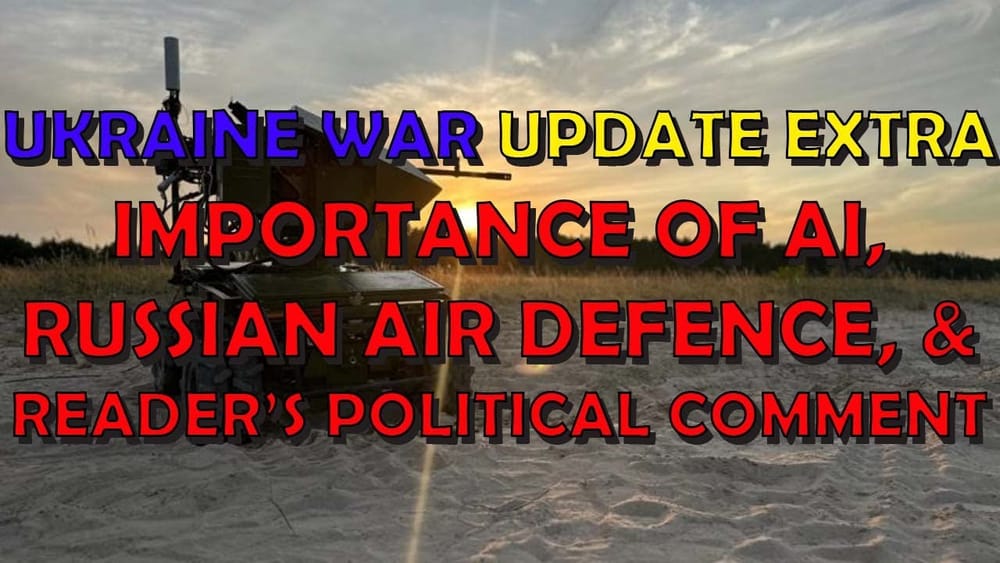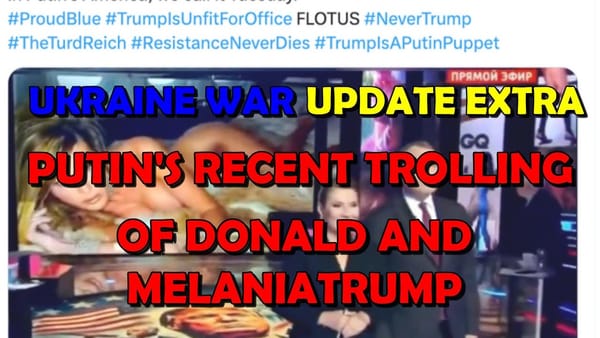Ukraine War Upd. EXTRA: Importance of AI, Russian Air Defence, & US Politics Comment
Table of Contents 📖
Hello Team
🎦 00:00-01:06⏩
Jonathan starts by explaining that this video was recorded two days ago but was delayed due to significant events. He warns viewers that the content relating to US politics can be divisive.
Return to top⤴️
Russian Air Defence Systems: Blanket too Small?
🎦 01:06-06:26⏩
Jonathan discusses recent Ukrainian strikes on strategic targets deep inside Russia, highlighting the insights of Chris O'Wickey.
- Russian air defence systems, particularly the Pantsir S-1 short-range systems, are being redeployed from areas like St Petersburg to protect Putin's luxury residence in Lake Valdai. This leaves other strategic locations vulnerable.
- The ongoing war has led to attrition of Russian air defence equipment over two years, necessitating the redeployment of these systems closer to the front lines and creating further gaps in Russia's air defences.
- This redeployment aligns with reports from Russian Telegram channels indicating a shortage of usable air defence systems in the St. Petersburg area due to their relocation to protect Putin's Valdai residence.
- Jonathan uses the analogy of a blanket that's too small for a bed, illustrating how protecting one area leaves others exposed. He emphasizes the vastness of Russia and the near-impossibility of defending it entirely, especially with limited resources.
- The effectiveness of Ukrainian long-range missiles and drones further complicates Russia's air defence strategy, as Putin prioritizes protecting his personal assets over potentially more strategically valuable targets.
- The attack on the Novotek gas facility near St. Petersburg underscores the effectiveness of these attacks and highlights the vulnerabilities created by redeploying air defence systems.
Russian Air Defence Systems: Difficulty with Smaller Targets
🎦 06:26-06:32⏩
- Jonathan notes that longer-range systems like the S-300, S-400 and Book-M1, which are prevalent in the St Petersburg region, face challenges in engaging smaller, slower targets flying at low altitudes, similar to the issues Ukrainian defences have with Shaheed drones.
AI: Key to Ukraine's Victory?
🎦 06:32-14:25⏩
- Jonathan discusses an analysis from Euromaidan Press that suggests AI is crucial to Ukraine's victory, outpacing even the US and China in AI development.
- He highlights Benjamin Jensen's (senior fellow at the Center for Strategic and International Studies' Future of Warfare Initiative) argument that Ukraine's bottom-up approach to AI development, driven by necessity and practicality, has proven more effective than the US's top-down, bureaucratic approach, which has resulted in costly failures despite substantial investment.
- Jonathan acknowledges Ukraine's pre-war reputation for technological proficiency, particularly in IT and app development, which has translated well into utilizing AI for military advantage.
- He outlines various applications of AI in the conflict, including:
- Evidence collection for war crimes and the identification of perpetrators.
- Drone control and targeting.
- Detection of Russian disinformation and propaganda.
- Demining efforts.
- Reconstruction planning.
- Jonathan uses the example of drones systematically mapping minefields to illustrate AI's efficiency, potentially surpassing the effectiveness of manual demining by large teams. He also mentions the use of AI in target acquisition for FPV drones and facial recognition for identifying war criminals.
- Jonathan cites General Mark Milley's prediction that a third of US armed forces will be robotized, highlighting the growing role of AI in warfare.
- Jonathan acknowledges concerns about the ethical implications of AI, particularly in facial recognition technology. He points to the controversy surrounding Clearview AI, a US company whose facial recognition software has been used by Ukrainian authorities to identify Russian soldiers.
- He notes the potential for misuse of facial recognition, including concerns about accuracy, bias, and privacy violations.
- Jonathan contrasts Ukraine's use of AI for wartime purposes with Russia's use of digital technology to create a "cyber gulag," effectively controlling and repressing its population through surveillance and censorship.
- He underscores the need for Ukraine to establish clear ethical guidelines for AI use after the conflict to prevent replicating Russia's repressive practices and to uphold human rights and freedoms.
AI: The Need for Ethical Guardrails
🎦 14:25-15:10⏩
- Jonathan emphasizes the importance of addressing the ethical concerns surrounding AI, particularly given its rapid development and potential risks.
- He notes that prominent figures like Elon Musk and Rishi Sunak (UK Prime Minister) have raised concerns about AI's potential negative consequences. Jonathan mentions Sunak's recent AI conference, which drew significant attention to these concerns.
US Politics: GOP Resistance to Ukraine Aid
🎦 15:10-29:17⏩
- Jonathan reads and responds to a comment from a viewer, "America's First Patriot," who offers a perspective on the political divide in the US regarding aid to Ukraine.
- The viewer's comment, based on observations and a video by Professor Gerdes (a Republican and supporter of Ukraine), suggests that the American right's resistance to Ukraine aid and less aggressive stance toward Russia stem from viewing Ukraine as a representation of the American political left, rather than seeing it as a separate entity with its own complex situation.
- The viewer posits that the Hunter Biden scandal in Ukraine has contributed to this perception, painting the country as a hub for corruption and globalist agendas. Additionally, they argue that the left's messaging on Ukraine has been too heavily focused on American cultural politics, such as LGBTQ+ rights, rather than on the broader geopolitical implications of the conflict. This focus on cultural issues alienates those on the right who hold different values.
- Jonathan acknowledges the validity of this viewpoint, having observed similar sentiments in his own research and interactions. He notes that many GOP voters align with what they perceive as Russia's stance on traditional values, often opposing progressive ideals on issues such as LGBTQ+ rights, abortion, and government intervention. This creates a cognitive dissonance where, despite recognizing Russia's aggression as inherently wrong, they find common ground with Russia's cultural stance, leading to less enthusiasm for supporting Ukraine.
- Jonathan emphasizes that this observation is not a criticism but an attempt to understand the root cause of the political impasse in the US regarding Ukraine aid. He believes understanding these differing perspectives is crucial for finding common ground and presenting a united front.
- Jonathan argues that the most effective way to sway skeptical GOP voters is to highlight the strategic importance of supporting Ukraine to US interests, emphasizing the economic and security benefits rather than relying solely on moral arguments.
- He suggests framing the conflict within the context of a global struggle against authoritarianism, drawing parallels between Soviet Russia and the current Russian regime. Highlighting the threat posed by a resurgent Russia, which aims to undermine Western democracy and expand its sphere of influence, can resonate with those who prioritize national security and a strong global order.
- Jonathan notes that many GOP voters perceive modern-day Russia as a continuation of the Soviet threat, driven by communist ideals and a desire to spread its ideology. While he disagrees with this assessment, acknowledging this perception and tailoring the messaging accordingly can help bridge the divide.
- The viewer's comment suggests that emphasizing the shared values of the West, particularly those related to national sovereignty and individual liberty, can be more persuasive than focusing on cultural differences.
- Jonathan concludes by acknowledging the importance of understanding the concerns of both sides of the political spectrum and tailoring messaging to address those concerns. He reiterates that a united front is essential for effectively supporting Ukraine and countering Russian aggression.
US Politics: The Future of US Democracy
🎦 29:17-39:42⏩
- Jonathan segues into a broader discussion about the dynamics of US politics, noting the limitations of the two-party system and the tendency to focus on capturing the political centre.
- He observes that in two-party systems, parties often prioritize appealing to moderate voters rather than addressing the concerns of those with more extreme views.
- Jonathan contrasts this with the evolving political landscape in the UK, where the rise of smaller parties like UKIP (now the Reform Party) and the Green Party has created a more fragmented electorate. This fragmentation forces larger parties to be more mindful of their positions and to appeal to a wider range of views to secure votes.
- He expresses concern about the lack of representation for a significant portion of the American electorate who may not identify with either major party. He believes this lack of choice contributes to political polarization and hinders effective governance.
- Jonathan also criticizes the Republican Party's shift to the right, questioning its effectiveness in a two-party system where capturing the centre is crucial for winning elections. He believes this strategy could alienate moderate voters and benefit the Democrats in upcoming elections.
- He notes that the Democrats could capitalize on this by adopting a more centrist approach, potentially appealing to moderate Republicans who are dissatisfied with their party's direction.
- Jonathan observes that while Republicans have traditionally campaigned on emotional appeals, often leveraging fear and cultural anxieties, Democrats could potentially use similar tactics by highlighting the implications of Republican policies, such as the overturning of Roe v. Wade, on issues like women's rights.
- Jonathan circles back to the upcoming 2024 US presidential election, emphasizing that the outcome will have significant consequences for Ukraine.
- He expresses skepticism that Trump is guaranteed to win, as many believe, and suggests that the Democrats have a chance to secure victory by focusing on key issues, such as border security and women's rights, that resonate with a broader electorate.
- Jonathan acknowledges that a Biden presidency would be more favourable for Ukraine than a Trump presidency, recognizing that this view is not universally shared. He bases his assertion on Trump's past actions and statements regarding Ukraine and his tendency to prioritize personal relationships over US national interests.
Youtube Thumbnails
🎦 39:42-40:50⏩
- Jonathan briefly digresses from politics to discuss his YouTube thumbnails, asking viewers for their opinion on a new design suggested by viewer Rajat Sharma.
- He acknowledges that he produces a large volume of content and needs to maintain a consistent and easily replicable thumbnail style. He expresses gratitude for the support of his viewers and credits his team, including JR (for mapping) and Grimsoft (for Discord moderation).
Wrap Up
🎦 40:50-41:15⏩
- Jonathan thanks viewers for their support and acknowledges that his opinions on US politics can be divisive. He defends his decision to discuss this topic, reiterating its significance in the context of the war in Ukraine and the global political landscape.
"The right and the left, especially in America, very much want to support and continue a system where the US is on top of a strong global order."



